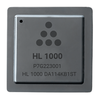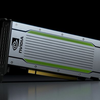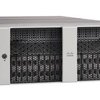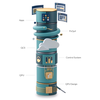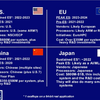Habana Labs emerged from stealth mode this week with the announcement of its custom-built AI inference processor that can outrun the fastest GPUs.
A bill that aims to keep the United States at the forefront of quantum information technology has been passed by the House of Representatives and is now headed to the Senate.
Episode 240: Addison Snell and Michael Feldman discuss Lenovo's newly-announced partnership with NetApp, NVIDIA's Tesla move, HPC on Wall Street, and Lenovo Transform 2.0.
At GTC Japan, NVIDIA announced the Tesla T4 GPU, the companys first datacenter product that incorporates the capabilities of the Turing architecture. To go along with the new hardware, the GPU-maker is also releasing enhanced TensorRT software.
Google has added a Dataset Search app to its empire of web-based tools, making it easier for researchers, analysts, and anyone else with an affection for data to access publicly available repositories.
Cisco has unveiled the UCS C480 ML M5 Rack Server, the companys first purpose-built offering for the burgeoning AI/machine learning market.
Episode 239: Addison Snell and Michael Feldman analyze Microsoft's integration of Cycle Cloud into its Azure platform and Baidu's claims about code-free machine learning.
Rigetti Computing has announced its Quantum Cloud Services (QCS), a platform the company hopes will run the worlds first application demonstrating quantum advantage.
According to the latest analysis from Hyperion Research, the various global efforts to reach exascale supercomputing are making good headway. But in some cases, the decision to develop domestically-produced processors for these systems and the inclusion of new application use cases appears to bestretching out the timelines.
Search giant Baidu has released EZDL, a software development platform for non-programmers who want to build production-level machine learning models.
